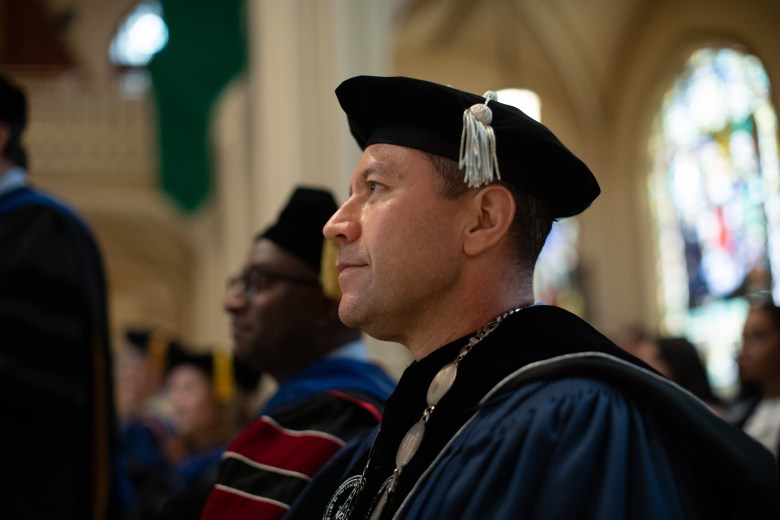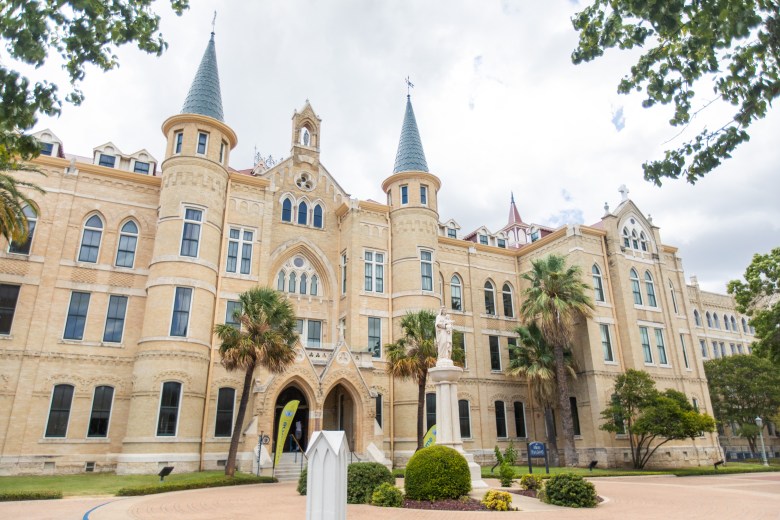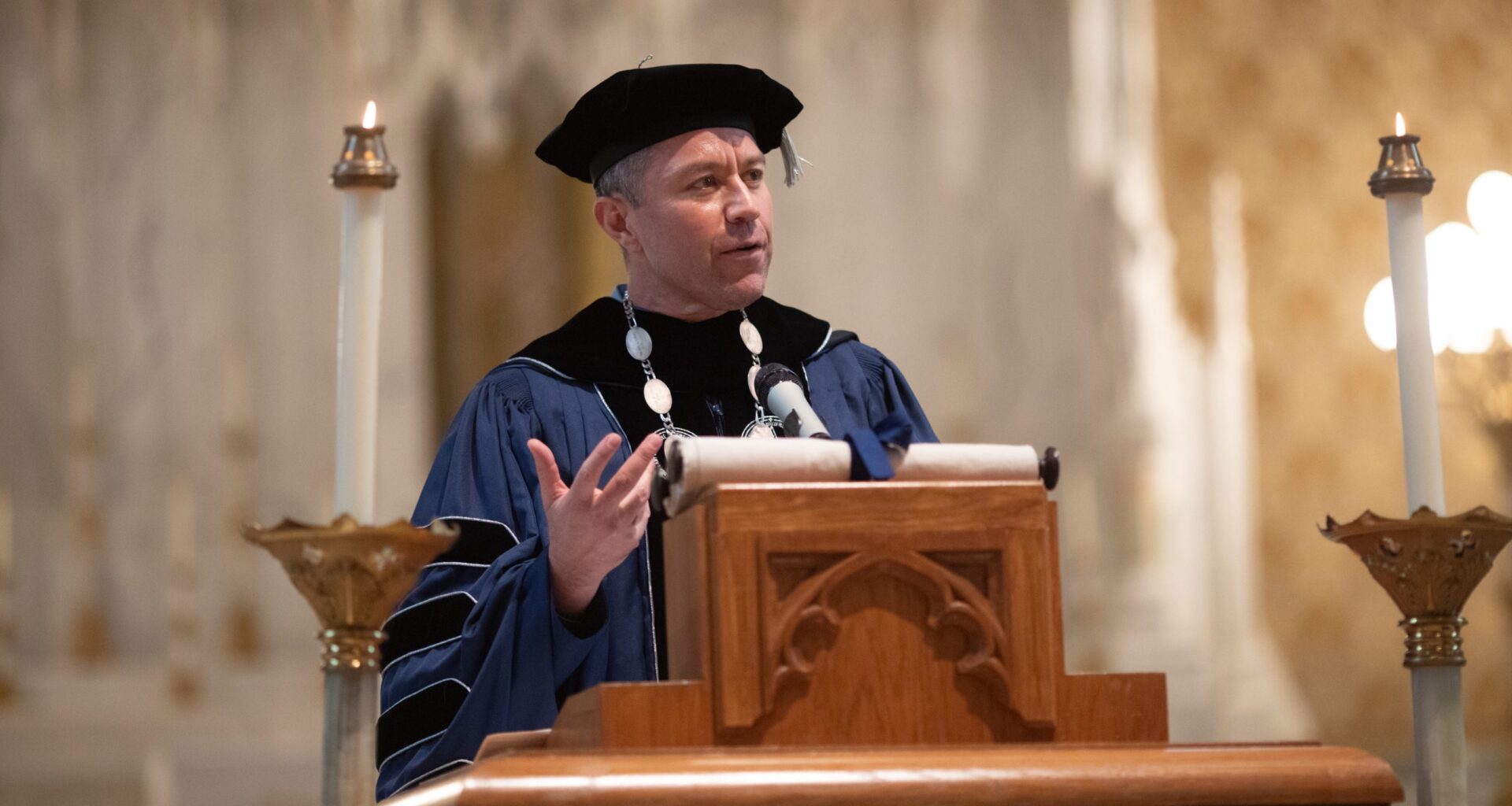Our Lady of the Lake University is embarking on its fourth academic year under the leadership of President Abel Antonio Chávez, who joined the Roman Catholic institution in July 2022.
This academic year, the private institution founded by the Sisters of the Congregation of Divine Providence, is celebrating its 130th anniversary, which Chávez said will be commemorated with a series of events announced throughout the year.
Earlier this year, university officials announced the decision to cut 15 academic programs, which also resulted in cuts to staff and faculty who were linked to these programs.
University officials referred to these changes as a realignment, which was the result of a two-year evaluation on the viability of all programs. Student enrollment had waned in not one specific department but throughout several programs, deeming them economically unviable for the future, according to previous statements.
Among the programs that will not return this fall are anthropology, biomathematics, English literature and creative writing.
The private university reported an enrollment of 1,968 students in the fall of 2024, down from 2,096 in the fall of 2023. At least 65 percent of students enrolled last fall reported being from San Antonio and 85 percent attended the university full time.
Chavez talks about these changes, the many challenges in higher education and the opportunities he envisions for OLLU and its community.
The OLLU president will soon be a part of a panel of top leaders focused on San Antonio’s higher education scene hosted by the San Antonio Report on Sept. 4.
This interview has been edited for length and clarity.
What is your current outlook of the state of higher education across the city and the nation?
There’s just so much happening everywhere across the world in terms of higher education; how students are thinking about what education is, why an education?
So as I start my fourth year, I’m just very excited. We have an incredible community of can do, will do, spirited faculty and staff who are just so committed to our mission as a Catholic, faith-based, Hispanic-serving institution.
I say this very proudly, that we here at OLLU, have the most challenging job in higher education, but also the most exciting, and the most promising job in higher education. Because we are a private institution, we receive no monies from the state. So we have to think differently about student success, matriculating our students, making sure that they have the resources to be successful.
 OLLU President Abel Chávez waits for his speech at a commencement held at the Sisters of Devine Providence Chapel on Friday. Credit: Vincent Reyna for the San Antonio Report
OLLU President Abel Chávez waits for his speech at a commencement held at the Sisters of Devine Providence Chapel on Friday. Credit: Vincent Reyna for the San Antonio Report
What is the best way to sell the value of a degree to potential students?
The reality of the industry of higher education is that costs are real. Not only the cost of attendance for our families and students, but also the cost of operating an institution. Both continue to increase.
And if we think about our own lives, there’s customization happening everywhere. So our students ought to be expecting customization of their education. How do iPads and iPhones and other artificial intelligence technologies play into how we learn? What is considered learning?
And as institutions, administrators and leaders, we have to be thinking about the interweaving of those dynamics in real time for the betterment of our students.
When it comes to the value of higher education, there continues to be discourse about what is the worth of a credential. But data continues to show that if one has a bachelor’s degree, the lifetime earnings are multiple times higher than if you don’t have a higher education credential. And it goes higher with the masters and even higher with the doctorate.
And that’s just earnings. You also have civic engagement, health outcomes, overall participation in various social activities is also much higher for someone with a higher education credential.
What does the traditional student demographic look like at OLLU and has that changed over the years?
Our student typically is Pell (Grant) eligible that perhaps prior to coming to Our Lady of the Lake University has been told ‘no.’
Also the typical profile of an OLLU student is a can-do individual with big dreams who is not afraid to tackle the biggest, the most complex challenges that they see around themselves. Those challenges could be how do I lift my family out of poverty? How do I bring infrastructure, technology into my neighborhood? How do I lift the health outcomes for neighborhoods like mine?
I mean, folks who are not shy about tackling the biggest challenges that they see around them.
How do you identify with your students and with the challenges they face?
I saw myself reflected in our students; first generation, Pell eligible, coming from neighborhoods similar to the West Side of San Antonio, the South Side of San Antonio.
My own neighborhood, the Denver neighborhood of Swansea, is very similar. So I was not wondering if OLLU would be a good fit for me, because I saw myself in the students.
How do you think being able to relate to the students makes your experience as president different?
Throughout the term, as much as possible, I dine in the cafeteria with our students. We have the best pozole, I think. I love to break bread with them. I love to converse with them. That allows me just in conversation to get to know them at a much deeper level. And it helps me understand the opportunities for us as an institution to achieve that excellence for them.
It’s really our students who are telling us where they want to go. And it also gives me great pride that even the (two-year) process that we embarked on was not led by the president. It was not led by the provost. It was faculty led.
 Our Lady of the Lake University prepares to celebrate 130 years of serving the San Antonio community. Credit: Vincent Reyna for the San Antonio Report
Our Lady of the Lake University prepares to celebrate 130 years of serving the San Antonio community. Credit: Vincent Reyna for the San Antonio Report
How soon will students be able to see the results of these assessments into new programs at OLLU?
This year. We’ve already launched some exciting initiatives like our MBA (Masters of Business Administration). We have a truly 12-month executive MBA program where a student finishes the MBA in this accelerated manner with the ability to also receive two additional concentrations or certifications in two important areas; nonprofit management and health care management.
As you prepare for another academic year, what are you excited about?
We are looking into creative ways to create efficient pathways to degree completion. Because what I continue to hear from families is that the time and the cost to credential completion matters a lot. So if a bachelor’s degree requires 120 credits for completion, then we should not be offering degrees at 138 or 141 credits. It just doesn’t benefit our students.
So we have to be efficient in the curricula design. And when it comes to cost, we’re approaching that a couple of different ways. One is that we created a tuition-lock program. That’s our promise to students and families. If you complete your credential in four years, our promise to you, students and families, is that we will not raise your tuition for four years.
Another way is that we’re looking for ways to create meaningful, value-added partnerships is with community colleges. We announced a recent partnership with Laredo College, and we created a pair of scholarships for those who wish to matriculate at OLLU.
